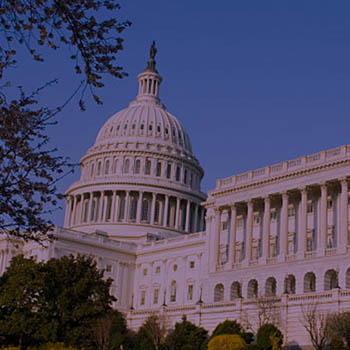
AGB seeks to ensure that the views of its members related to board governance and institutional leadership are at the forefront of policy discussions as reauthorization of the Higher Education Act (HEA) and other legislative and regulatory actions are underway.
AGB has reviewed and prioritized the top federal policy issues for the association and its members for November 2019-November 2020. These issues are clustered into two categories: policies that affect institutional vitality and policies that affect student success. However, AGB recognizes that these categories are not mutually exclusive, and in fact are interconnected.
Priorities
- Maintaining Standards for Board Governance as part of Accreditation Reviews
- Supporting Board Member Education
- Repealing the Federal Excise Tax on College and University Net Investment Income
- Supporting the Universal Charitable Deduction
- Increasing College Access and Completion
- Supporting Innovation Across Higher Education
- Advocating for DACA Students and Sensible Immigration Reform
- Repealing of the “Kiddie” Tax
- Promoting the Simplification of Student Tax Credits
Institutional Vitality
1. Maintaining Standards for Board Governance as part of Accreditation Reviews
Accreditors currently have high standards for board governance and AGB believes that accreditors should maintain these standards as they relate to fiduciary responsibilities. Generally, standards for board governance tend to include ensuring the institution’s mission is kept current; ensuring the financial health and sustainability of the institution; reviewing and strengthening educational quality; selecting and regularly evaluating the institution’s president; empowering the president to manage the institution; and focusing on oversight, not management. Other standards include engaging in board performance assessments, defining and addressing conflicts of interest, safeguarding the board’s independence from undue influence, and working effectively within clear governance policies and practices. Because boards oversee issues and determine policies that are critical to the integrity and success of their institutions, AGB believes that accreditors should maintain standards related to the responsibilities of boards.
2. Supporting Board Member Education
Because of the importance of governing boards, AGB believes that every institution has the responsibility to ensure that its board members receive appropriate preparation and continued engagement. Therefore, AGB supports adding a provision to HEA’s program participation agreement (PPA) for institutions certify that their board members are sufficiently educated about their roles and responsibilities.
3. Repealing the Federal Excise Tax on College and University Net Investment Income
On July 3, 2019, the U.S. Department of the Treasury published its proposed regulations on the 1.4 percent federal excise tax on the net investment income of private college and university endowments and other institutional assets. The excise tax is part of the 2017 Tax Cut and Jobs Act (TCJA). AGB remains opposed to this tax because of its negative effects on how the targeted institutions spend endowment funds, how they must now value gifts of appreciated property, and how their cash assets outside of the endowment are considered taxable. Large amounts of endowment dollars are now being redirected to the U.S Treasury and away from student financial aid, scientific research, and other critical mission-related activities. The law and Treasury regulations set a dangerous precedent for declaring the assets of all not-for-profit colleges and universities taxable in the future.
4. Supporting the Universal Charitable Deduction
Two bills have been introduced in the House to establish a universal charitable deduction (an above the line deduction that is taken before determining adjusted gross income) whereby itemizers and non-itemizers alike would receive tax benefits from their gifts to colleges and universities. As a result of the Tax Cuts and Jobs Act (TCJA), only about 10 percent of taxpayers itemize their tax returns. AGB supports this expansion of charitable giving because it provides more opportunity for donors and philanthropists to support students and higher education.
Student Success
5. Increasing College Access and Completion
AGB supports a number of proposals and robust investments that would help ensure that all students are able to access and complete a higher education. Specifically, AGB supports simplifying the FAFSA, increasing investments in campus-based aid programs and Federal TRIO and GEAR UP programs, increasing Pell Grant awards and future funding, and improving income-driven loan repayments.
6. Supporting Innovation Across Higher Education
AGB’s members work to support and spur academic innovation at their institutions, which is why AGB is in favor of expanding competency-based education (CBE) programs, institutional alternatives to remedial coursework, transfer credit policies, stackable credentials, and industry partnerships.
7. Advocating for DACA Students and Sensible Immigration Reform
AGB has remained an ally of DACA recipients, undocumented young people who were brought to the U.S. as children. DACA students enrolled in higher education enrich our communities, contribute to institutional research and service missions, pay taxes, and are an important part of our country’s workforce pipeline. AGB encourages Congress to pass a permanent legislative solution to allow these individuals to remain in the U.S. Additionally, since institutions benefit from the international exchange of students, scholars, scientists, and researchers, AGB supports sensible immigration reform that allows for predictable exchanges.
8. Repealing of the “Kiddie” Tax
The TCJA requires that the portion of scholarships and grants spent on non-tuition expenses, such as room and board, can no longer be taxed at the parent’s tax rate but at a considerably higher rate (up to 37 percent). An unintended consequence of the TCJA, this tax provision negatively affects many low- and moderate-income students and families.
9. Promoting the Simplification of Student Tax Credits
AGB supports efforts to simplify and consolidate three existing higher education tax provisions that benefit low- and middle-income students: the American Opportunity and Lifelong Learning tax credits and the Tuition and Fees Deduction. AGB believes that clear and understood provisions will benefit students and parents.

